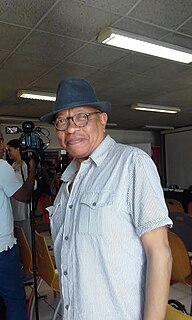
The history of Madagascar is distinguished clearly by the early isolation of the landmass from the ancient supercontinent containing Africa and India, and by the island's late colonization by human settlers from the Sunda islands and from East Africa. These two factors facilitated the evolution and survival of thousands of endemic plant and animal species, some of which have gone extinct or are currently threatened with extinction due to the government not allocating resources to help the growing population, causing many people to resort to harmful environmental practices as a way of survival. Trade in the Indian Ocean at the time of first colonization of Madagascar was dominated by large ships, called Djong, coming from Java and Sumatra.

Raymond Poulidor, nicknamed "Pou-Pou", was a French professional racing cyclist, who rode for Mercier his entire career.

Deauville is a commune in the Calvados département in the Normandy region in northwestern France. Major attractions include its harbour, race course, marinas, conference centre, villas, Grand Casino, and sumptuous hotels. The first Deauville Asian Film Festival took place in 1999. Deauville is regarded as the "queen of the Norman beaches" and one of the most prestigious seaside resorts in all of France. As the closest seaside resort to Paris, the city and its region of the Côte Fleurie has long been home to French high society's seaside houses and is often referred to as the Parisian riviera.

The Malagasy Uprising was a Malagasy nationalist rebellion against French colonial rule in Madagascar, lasting from March 1947 to February 1949. Starting in late 1945, Madagascar's first French National Assembly deputies, Joseph Raseta, Joseph Ravoahangy and Jacques Rabemananjara of the Mouvement démocratique de la rénovation malgache (MDRM) political party, led an effort to achieve independence for Madagascar through legal channels. The failure of this initiative and the harsh response it drew from the Socialist Ramadier administration radicalized elements of the Malagasy population, including leaders of several militant nationalist secret societies.

The Malagasy Revolutionary Party, better known by its Malagasy acronym AREMA, is a political party in Madagascar. It was the ruling party of the Democratic Republic of Madagascar, a Marxist–Leninist one-party socialist state, from 1976 to 1992.

Mohammed Lakhdar-Hamina is an Algerian film director and screenwriter. He is best known for his 1975 film Chronicle of the Years of Fire. He is one of the most prominent figures in contemporary Arabic cinema.

Days of Glory is a 2006 French film directed by Rachid Bouchareb. The cast includes Sami Bouajila, Jamel Debbouze, Samy Naceri, Roschdy Zem, Mélanie Laurent and Bernard Blancan.

Presidential elections were held in Madagascar on 3 December 2006. President Marc Ravalomanana, in office since he prevailed in a dispute over election results in 2002, ran for re-election. On 9 December, Ravalomanana was declared to have won in the first round with about 55 percent of the vote.

Eusèbe Jaojoby, commonly known by his surname Jaojoby[ˈdzodzubʲ], is a Malagasy composer and singer of salegy, a musical style of northwestern Madagascar. Critics consider him to be one of the originators of the modern salegy style that emerged in the 1970s, and credit him with transforming the genre from an obscure regional musical tradition into one of national and international popularity. Jaojoby also contributed to the creation of two salegy subgenres, malessa and baoenjy. Jaojoby has been called the most popular singer in Madagascar and the Indian Ocean islands, and is widely referred to as the "King of Salegy". His success has earned him such honors as Artist of the Year in Madagascar for two consecutive years (1998–1999) and the role of Goodwill Ambassador for the United Nations Population Fund in 1999.

Parliamentary elections were held in Madagascar on 23 September 2007, with the vote to be repeated in two constituencies on 14 November 2007. 637 candidates contested the election, in which the 127 seats in the National Assembly were at stake.

The culture of Madagascar reflects the origins of the people Malagasy people in Southeast Asia, East Africa and Oceania. The influence of Arabs, Indians, British, French and Chinese settlers is also evident. The most emblematic instrument of Madagascar, the valiha, is a bamboo tube zither carried to the island by early settlers from southern Borneo, and is very similar in form to those found in Indonesia and the Philippines today. Traditional houses in Madagascar are likewise similar to those of southern Borneo in terms of symbolism and construction, featuring a rectangular layout with a peaked roof and central support pillar. Reflecting a widespread veneration of the ancestors, tombs are culturally significant in many regions and tend to be built of more durable material, typically stone, and display more elaborate decoration than the houses of the living. The production and weaving of silk can be traced back to the island's earliest settlers, and Madagascar's national dress, the woven lamba, has evolved into a varied and refined art. The Southeast Asian cultural influence is also evident in Malagasy cuisine, in which rice is consumed at every meal, typically accompanied by one of a variety of flavorful vegetable or meat dishes. African influence is reflected in the sacred importance of zebu cattle and their embodiment of their owner's wealth, traditions originating on the African mainland. Cattle rustling, originally a rite of passage for young men in the plains areas of Madagascar where the largest herds of cattle are kept, has become a dangerous and sometimes deadly criminal enterprise as herdsmen in the southwest attempt to defend their cattle with traditional spears against increasingly armed professional rustlers.
The Cinema of Niger began in the 1940s with the ethnographical documentary of French director Jean Rouch, before growing to become one of the most active national film cultures in Francophone Africa in the 1960s-70s with the work of filmmakers such as Oumarou Ganda, Moustapha Alassane and Gatta Abdourahamne. The industry has slowed somewhat since the 1980s, though films continue to be made in the country, with notable directors of recent decades including Mahamane Bakabe, Inoussa Ousseini, Mariama Hima, Moustapha Diop and Rahmatou Keïta. Unlike neighbouring Nigeria, with its thriving Hausa and English-language film industries, most Nigerien films are made in French with Francophone countries as their major market, whilst action and light entertainment films from Nigeria or dubbed western films fill most Nigerien theatres.

The cinema of Senegal is a relatively small film industry which experienced its prime from the 1960s through to the early 1980s, but has since declined to less than five feature films produced in the last ten years.

The 41st Cannes Film Festival was held from 11 to 23 May 1988. The Palme d'Or went to the Pelle erobreren by Bille August.

Philibert Rabezoza, better known by the name Rakoto Frah, was a flautist and composer of traditional music of the central highlands of Madagascar. Born in 1923 near the capital city of Antananarivo to a poor rural family, Rakoto Frah surmounted the challenges posed by his underprivileged origins to become the most acclaimed 20th century performer of the sodina flute, one of the oldest traditional instruments on the island. Through frequent international concerts and music festival performances, he promoted the music of the highlands of Madagascar and became one of the most famous Malagasy artists, both within Madagascar and on the world music scene.

Mahaleo is a folk-pop band from Madagascar that is widely viewed as the most popular Malagasy group of all time. The band was founded by Dama with six of his classmates after first performing together during the rotaka student protests at their high school on 13 May 1972. Mahaleo's lyrics draw upon the indirect language of traditional hainteny and ohabolana to expose contemporary political and social issues and invite listeners to identify their own solutions.

The Cinema of Madagascar refers to the film industry in Madagascar.

Hery Martial Rajaonarimampianina Rakotoarimanana is a Malagasy politician who was President of Madagascar from January 2014 to September 2018, resigning to run for re-election. Previously he served as Minister of Finance under President Andry Rajoelina, and he was the Rajoelina political movement's candidate in the 2013 presidential election. He won the vote in a second round, defeating Jean-Louis Robinson, the candidate of Marc Ravalomanana's party. Once he was elected, Rajaonarimampianina held the world record of the head of state with the longest name as well as family name.

Raymond Rajaonarivelo is a Malagasy film director.
Marie-Clémence Andriamonta Paes, is a Malagasy French filmmaker. She has produced several critically acclaimed feature documentaries including: Angano... Angano..., Mahaleo and L'opéra du bout du monde. Apart from direction, she is also a producer and writer.














